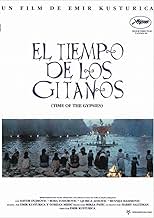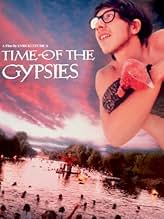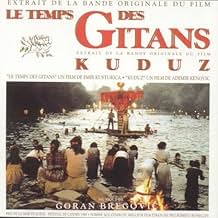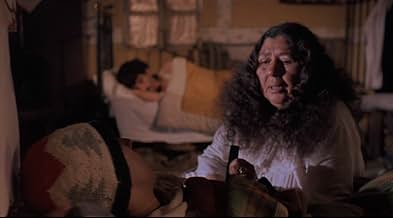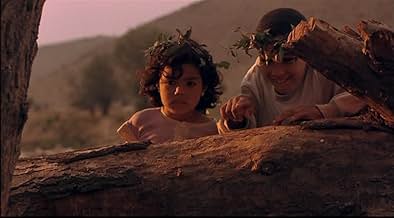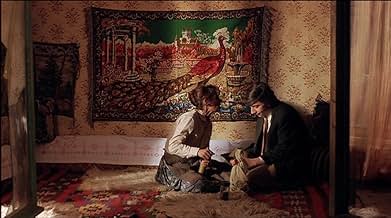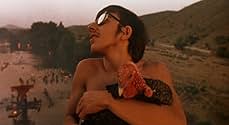VALUTAZIONE IMDb
8,1/10
33.869
LA TUA VALUTAZIONE
Intorno a Sarajevo e in Italia, un simpatico giovane zingaro di nome Perhan, è dotato di poteri telecinetici e viene sedotto dal mondo della microcriminalità, che minaccia di distruggere lui... Leggi tuttoIntorno a Sarajevo e in Italia, un simpatico giovane zingaro di nome Perhan, è dotato di poteri telecinetici e viene sedotto dal mondo della microcriminalità, che minaccia di distruggere lui e coloro che ama.Intorno a Sarajevo e in Italia, un simpatico giovane zingaro di nome Perhan, è dotato di poteri telecinetici e viene sedotto dal mondo della microcriminalità, che minaccia di distruggere lui e coloro che ama.
- Regia
- Sceneggiatura
- Star
- Premi
- 3 vittorie e 5 candidature totali
Recensioni in evidenza
In Russia we have a fine 300 minutes (without kidding) DVD release of the movie (the "director's cut"?). It has its moments. The first part is hilarious and witty. The second one is absurd and insane. The third is depressing and scary. The forth is enterprising and weird. The last one is violent and tragic. To crown it all, the only reason that this feature is an outsider (it is not in IMDb top 250) seems to be the following: not many people saw it.
It doesn't look like fiction. It feels quite gritty and has very adult topics. The Gypsies look and act like Gypsies (well, at least to my taste and knowledge). There was once a serial on Russian TV called "Karmelita", where the Gypsies were shown civilized, snobbish, stylish in their dressing, good-looking, etc. They were talking and talking (in pure Russian, of course, phonetically perfect), showing a little bit more emotion than lamas (sorry my exaggeration). Personally, very thankful to my relatives that they did not spend their precious watching that never ending fiction. The title song in that "Gypsy" serial was sung by Mr Nikolay Baskov (a real "Gypsy" with blond hair). It lasted as long as 200+ parts mixed with good portion of commercials. Instead of prolonged showing of the "epic" "Karmelita" our TV should have shown "Dom za vesanje". On the other hand, they would have spoiled the whole movie by pushing commercials into it. So, let the matter rest.
The only really bad thing about "Dom za vesanje" movie seems to be the way of its DVD presentation: after the end of each part there is a kind of sketch of the next one before the credits roll over. These spoilers are not enjoyable.
Still it also has some minor drawbacks. To me they are camera-work and the absence of powerful scenery shots, i.e. the lack of the contrast and the ability to see what happens in good detail.
An 8 for this poesy of human existence in hellish surroundings will do. Thank you for attention.
It doesn't look like fiction. It feels quite gritty and has very adult topics. The Gypsies look and act like Gypsies (well, at least to my taste and knowledge). There was once a serial on Russian TV called "Karmelita", where the Gypsies were shown civilized, snobbish, stylish in their dressing, good-looking, etc. They were talking and talking (in pure Russian, of course, phonetically perfect), showing a little bit more emotion than lamas (sorry my exaggeration). Personally, very thankful to my relatives that they did not spend their precious watching that never ending fiction. The title song in that "Gypsy" serial was sung by Mr Nikolay Baskov (a real "Gypsy" with blond hair). It lasted as long as 200+ parts mixed with good portion of commercials. Instead of prolonged showing of the "epic" "Karmelita" our TV should have shown "Dom za vesanje". On the other hand, they would have spoiled the whole movie by pushing commercials into it. So, let the matter rest.
The only really bad thing about "Dom za vesanje" movie seems to be the way of its DVD presentation: after the end of each part there is a kind of sketch of the next one before the credits roll over. These spoilers are not enjoyable.
Still it also has some minor drawbacks. To me they are camera-work and the absence of powerful scenery shots, i.e. the lack of the contrast and the ability to see what happens in good detail.
An 8 for this poesy of human existence in hellish surroundings will do. Thank you for attention.
10eilgin
This movie shines as an example of pure art in cinema. So powerful with symbolism and story telling, "Time of Gypsies" delivers amazing performances on acting, settings, musical scores, and overall directing.
In year 1988, this movie was one of the most awaited films in the Istanbul International Film Festival. I was one of the lucky ones who had a ticket for the film. When the show time arrived, it was obvious that there was a problem since the film did not started. A lady from the festival committee came to the stage announcing their appology and explaining what the problem was; they were expecting the copy of the film from the its distributor in USA. Unfortunately there was a logistics problem, so they had to get it directly from Yugoslavia. When the festival organisation put their Yugoslavian translators at work they did not understand which language it was! And a cleaning lady, who was an actual gypsy figured out that the movie was in Gypsy language. So it was not possible to translate it for the festival.
So they offered an apology and refund in case anybody did not want to watch it without subtitles.
Nobody left the theatre. We watched the movie without understanding a word. But, at the end there was a standing ovation at the theatre went on for a couple of minutes.
In year 1988, this movie was one of the most awaited films in the Istanbul International Film Festival. I was one of the lucky ones who had a ticket for the film. When the show time arrived, it was obvious that there was a problem since the film did not started. A lady from the festival committee came to the stage announcing their appology and explaining what the problem was; they were expecting the copy of the film from the its distributor in USA. Unfortunately there was a logistics problem, so they had to get it directly from Yugoslavia. When the festival organisation put their Yugoslavian translators at work they did not understand which language it was! And a cleaning lady, who was an actual gypsy figured out that the movie was in Gypsy language. So it was not possible to translate it for the festival.
So they offered an apology and refund in case anybody did not want to watch it without subtitles.
Nobody left the theatre. We watched the movie without understanding a word. But, at the end there was a standing ovation at the theatre went on for a couple of minutes.
'Time of the Gypsies' is a big, full movie.
It is full in the way a magic realism novel is full, with its intergenerational cast of characters; its vivid sense of place, the weather and community life, where private is always public, where joy and tragedy are inextricable; where magic, dream and delusion are indistinguishable.
It is full in the Fellini sense, with its grand, often hallucinatory, set pieces; its profusion of grotesques; its bursting compression of many plots; its general noisiness.
It is one film containing many simultaneous films (a gangster film; a surreal road movie; a romantic comedy; a rites-of-passage; a Christian allegory).
It somehow feels a little thin, like a tapestry of chunks from a massive novel. It is certainly a prime example of retrospective dating - at the time it seemed a masterpiece; over a decade on, it's pastiche Kusturica.
It is full in the way a magic realism novel is full, with its intergenerational cast of characters; its vivid sense of place, the weather and community life, where private is always public, where joy and tragedy are inextricable; where magic, dream and delusion are indistinguishable.
It is full in the Fellini sense, with its grand, often hallucinatory, set pieces; its profusion of grotesques; its bursting compression of many plots; its general noisiness.
It is one film containing many simultaneous films (a gangster film; a surreal road movie; a romantic comedy; a rites-of-passage; a Christian allegory).
It somehow feels a little thin, like a tapestry of chunks from a massive novel. It is certainly a prime example of retrospective dating - at the time it seemed a masterpiece; over a decade on, it's pastiche Kusturica.
I'm glad I was bored on a Friday night and decided to browse the foreign film section. I randomly picked Time of the Gypsies, and now it is my favorite. The soundtrack, as well as the movie, is amazing. This film is unique in almost every aspect. It was moving without being too gushy or fake--I highly recommend seeing it. The other commentees have said pretty much everything else about this film in an nicely eloquent way, so I feel I need not elaborate. :)
In 1933 Spanish poet and theater director Federico Garcia Lorca gave a lecture in Buenos Aires titled "Play and Theory of the Duende" in which he addressed the fiery spirit, the 'duende', behind what makes great performance stir the emotions: "The duende, then, is a power, not a work. It is a struggle, not a thought. I have heard an old maestro of the guitar say, "The duende is not in the throat; the duende climbs up inside you, from the soles of the feet.' Meaning this: it is not a question of ability, but of true, living style, of blood, of the most ancient culture, of spontaneous creation."
So okay, Kusturica has mostly come and gone by now. But for a while he really tapped into a valuable duende. I don't know how much of that translates overseas as anything more than feisty craziness, but for those of us here at least he stirred passions that go back in time. He communicated something of the very fabric of our world.
So yes, a living style. Spontaneous creation. Meaning an exaggerated depiction; but one rooted in a recognizable reality, in ancient culture. Reckless people, who consume their beings with spontaneous love or song; the Balkans, meant broadly as a peoples whose common life and toll under Ottoman rule brought them so close, wrote ourselves into this worldview long before Kusturica. Like Goran Bregovic collected old folk songs into new renditions for these films, Kusturica merely translated into cultural images. But oh so well.
Τhis is why Kusturica really spoke to common people here. He reminded them, yes with so much feisty craziness, about a struggle - not a thought - about a life they instinctively have known from blood; so hard that sometimes it makes the eyes well up with tears of joy. About a woe so deep it can only be expressed with dance or a burning cigarette to the arm. About something inexplicable that turns the soul upside down.
Two paths in life then as I see it, both valuable; we should strive to be either Zorbas or Buddhas. That is to say, to either grasp life till it hurts or dispassionately let go. It's about living life fully in the flow of it, and we either vigorously swim or we observe how it all flows away. Everything else is really half-assed stuff, merely trying to stay afloat. Kusturica made films about Zorbas.
All this is well. But if we have perhaps invested part of ourselves in cinema, the images behind, Kusturica, especially here, is a real joy to behold. There was Tarkovsky, who inspired him so much; his stare was austere like those lean Christs we find in Orthodox icons. With Kusturica, Tarkovsky's camera becomes magical song, embodying with ardor of life the joyous sadness of a world turned upside down - so much in the film is about things askew, a house suspended in the air, a man hanging himself from a bell, the image of an inverted Christ in the end.
So one masterful touch is the cinematic flow. The other is how the flow encompasses an entire life; we have a kid who grows up to see how everything in life breaks, a grownup - as this kid - who has already resigned himself to the fact and is broken himself beyond salvation, a young mother who gives birth and dies like the dead mother who is only hearsay now, a second Perhan who will grow up with only hearsay of that young mother but with a father who came back to him. Fascinating stuff, most importantly because the symbolism is not a full circle, neat, precise, but messy, rugged with life.
This is good stuff. It is just not-important enough - in the academic sense - to be really beautiful, and just incomplete enough to allow ourselves to pour into it.
So okay, Kusturica has mostly come and gone by now. But for a while he really tapped into a valuable duende. I don't know how much of that translates overseas as anything more than feisty craziness, but for those of us here at least he stirred passions that go back in time. He communicated something of the very fabric of our world.
So yes, a living style. Spontaneous creation. Meaning an exaggerated depiction; but one rooted in a recognizable reality, in ancient culture. Reckless people, who consume their beings with spontaneous love or song; the Balkans, meant broadly as a peoples whose common life and toll under Ottoman rule brought them so close, wrote ourselves into this worldview long before Kusturica. Like Goran Bregovic collected old folk songs into new renditions for these films, Kusturica merely translated into cultural images. But oh so well.
Τhis is why Kusturica really spoke to common people here. He reminded them, yes with so much feisty craziness, about a struggle - not a thought - about a life they instinctively have known from blood; so hard that sometimes it makes the eyes well up with tears of joy. About a woe so deep it can only be expressed with dance or a burning cigarette to the arm. About something inexplicable that turns the soul upside down.
Two paths in life then as I see it, both valuable; we should strive to be either Zorbas or Buddhas. That is to say, to either grasp life till it hurts or dispassionately let go. It's about living life fully in the flow of it, and we either vigorously swim or we observe how it all flows away. Everything else is really half-assed stuff, merely trying to stay afloat. Kusturica made films about Zorbas.
All this is well. But if we have perhaps invested part of ourselves in cinema, the images behind, Kusturica, especially here, is a real joy to behold. There was Tarkovsky, who inspired him so much; his stare was austere like those lean Christs we find in Orthodox icons. With Kusturica, Tarkovsky's camera becomes magical song, embodying with ardor of life the joyous sadness of a world turned upside down - so much in the film is about things askew, a house suspended in the air, a man hanging himself from a bell, the image of an inverted Christ in the end.
So one masterful touch is the cinematic flow. The other is how the flow encompasses an entire life; we have a kid who grows up to see how everything in life breaks, a grownup - as this kid - who has already resigned himself to the fact and is broken himself beyond salvation, a young mother who gives birth and dies like the dead mother who is only hearsay now, a second Perhan who will grow up with only hearsay of that young mother but with a father who came back to him. Fascinating stuff, most importantly because the symbolism is not a full circle, neat, precise, but messy, rugged with life.
This is good stuff. It is just not-important enough - in the academic sense - to be really beautiful, and just incomplete enough to allow ourselves to pour into it.
Lo sapevi?
- QuizThe first feature to be filmed with its entire dialogue in the Gypsy language, Romany.
- ConnessioniFeatured in Horrible Reviews: Best Movies I've Seen In 2021 (2022)
I più visti
Accedi per valutare e creare un elenco di titoli salvati per ottenere consigli personalizzati
- How long is Time of the Gypsies?Powered by Alexa
Dettagli
- Data di uscita
- Paesi di origine
- Lingue
- Celebre anche come
- Time of the Gypsies
- Luoghi delle riprese
- Sutka, North Macedonia(most of the film)
- Aziende produttrici
- Vedi altri crediti dell’azienda su IMDbPro
Botteghino
- Lordo Stati Uniti e Canada
- 280.015 USD
- Tempo di esecuzione
- 2h 22min(142 min)
- Colore
- Proporzioni
- 1.85 : 1
Contribuisci a questa pagina
Suggerisci una modifica o aggiungi i contenuti mancanti



